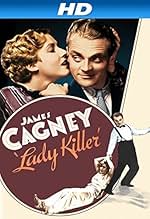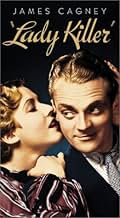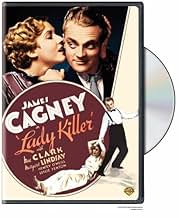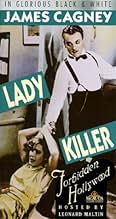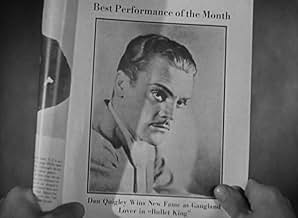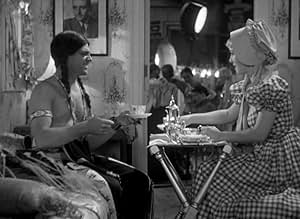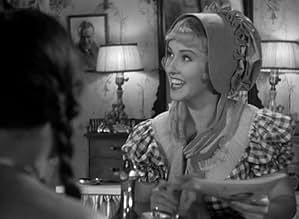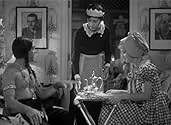CALIFICACIÓN DE IMDb
7.0/10
2.1 k
TU CALIFICACIÓN
Un antiguo gángster triunfa en Hollywood, pero su antigua vida lo alcanza.Un antiguo gángster triunfa en Hollywood, pero su antigua vida lo alcanza.Un antiguo gángster triunfa en Hollywood, pero su antigua vida lo alcanza.
- Dirección
- Guionistas
- Elenco
- Premios
- 1 premio ganado en total
Douglass Dumbrille
- Spade Maddock
- (as Douglas Dumbrille)
William B. Davidson
- Director Williams
- (as William Davidson)
Lowden Adams
- Lois' Butler
- (sin créditos)
Luis Alberni
- Director
- (sin créditos)
Joseph Belmont
- Monkey Party Guest
- (sin créditos)
Brooks Benedict
- Charlie - the Fence
- (sin créditos)
Harry Beresford
- Dr. Crane
- (sin créditos)
Opiniones destacadas
Jimmy Cagney plays a gangster in this film. However, despite having seen him play such a role in countless other films, this one is unique and well worth seeing because it STILL dares to be different.
Cagney is a wanted man back East, so he gets the idea of going to the West Coast to hang out and wait for things to die down. However, once there he is discovered by Hollywood and stars in gangster films because he is "so natural and believable". Well, despite his very shady past, Cagney tries to go straight and likes the life of a star. However, old associates realize who he is and try to blackmail him.
The film is a light comedy that invigorates the standard gangster genre. For its uniqueness and excellent acting and writing, the film gets an 8.
Cagney is a wanted man back East, so he gets the idea of going to the West Coast to hang out and wait for things to die down. However, once there he is discovered by Hollywood and stars in gangster films because he is "so natural and believable". Well, despite his very shady past, Cagney tries to go straight and likes the life of a star. However, old associates realize who he is and try to blackmail him.
The film is a light comedy that invigorates the standard gangster genre. For its uniqueness and excellent acting and writing, the film gets an 8.
If you like James Cagney, and I sure do, you'll love this comedy melodrama from the pre-code years at Warner Brothers. Cagney portrays a cheap hoodlum who falls in with a gang of petty con artists, gets wrapped on the knucklesl by the long arm of the law, and winds up becoming a movie matinee idol. It's fun all the way, with enough wise-cracking dialogue, rapid action, car chases, gunfire, and double-dealing to satisfy any fan of the early gangster films, yet it's a lively, tongue-in-cheek comedy from start to finish. Enjoy!
Lady Killer (1933)
*** (out of 4)
James Cagney plays a movie usher who gets fired and then gets mixed up with some gangster being led by Douglas Dumbrille and Margaret Lindsay. Soon a crime goes wrong so Cagney runs off to Hollywood where he starts work as an extra but quickly becomes a movie star. This is an enjoyable little comedy that works pretty well as a spoof of Hollywood and it gives Cagney a chance to make fun of his own image. Cagney is very good in his role, which once again shows him as a cocky, high tempered thug but there's also other moments including Cagney playing an Indian as well as showing off his comic side. Mae Clarke plays Cagney's love interest in Hollywood and the two are very good together with that infamous scene of Cagney dragging her across the floor by her hair. Both Lindsay and Dumbrille add nice support in their roles. One of the film's highlights is when Cagney orders two dozen monkeys to a party where they escape and cause all sorts of trouble. There's also plenty of nice gags aimed at Hollywood and directors. The film starts to run out of steam during the final act but if you're a fan of Cagney or films of this era then this is certainly worth checking out.
*** (out of 4)
James Cagney plays a movie usher who gets fired and then gets mixed up with some gangster being led by Douglas Dumbrille and Margaret Lindsay. Soon a crime goes wrong so Cagney runs off to Hollywood where he starts work as an extra but quickly becomes a movie star. This is an enjoyable little comedy that works pretty well as a spoof of Hollywood and it gives Cagney a chance to make fun of his own image. Cagney is very good in his role, which once again shows him as a cocky, high tempered thug but there's also other moments including Cagney playing an Indian as well as showing off his comic side. Mae Clarke plays Cagney's love interest in Hollywood and the two are very good together with that infamous scene of Cagney dragging her across the floor by her hair. Both Lindsay and Dumbrille add nice support in their roles. One of the film's highlights is when Cagney orders two dozen monkeys to a party where they escape and cause all sorts of trouble. There's also plenty of nice gags aimed at Hollywood and directors. The film starts to run out of steam during the final act but if you're a fan of Cagney or films of this era then this is certainly worth checking out.
Lady Killer (1933)
I love these multi-part stories, where one set of scenes shifts to a whole new set, and then they eventually intertwine. And I also love movies that show the inside of Hollywood, with actual recreations of movie sets and movie shoots.
Lady Killer has both, and James Cagney, too. It's fast, furious, funny, and shot with a bright, glinting intelligence. Not quite a gangster film, it does have crime and some crooked thugs. And not quite a comedy, it pulls out quite a few laughs, mostly because Cagney is a card. There are two fabulous first ladies (and they naturally must view for our man), Mae Clark and Margaret Lindsay, and a slew of second men who hold up their characters with caricature.
In all, there is no Warner message here, except maybe the virtue can sometimes prevail. It's just a lot of great scenes, witty dialog, and a play of good guys against bad guys. Look for some stunning rain scenes in California (yeah, I know), and for a huge range of interior and exterior set ups, fairly elaborate for Warner Bros. budgets.
For Cagney fans, it's a riot to see him take on, briefly, a series of roles as Indian chief, Italian lover, and prisoner on work detail. The latter, of course, is close to the real roles that made him famous, and his role here is actually a little lighter than that, a bad guy who is all wisecracks and cheerfulness. Look for some insider jokes, like the poster (and mention) of the Edward G. Robinson film, and the movie ushers wearing hats all with the Warner Brothers logo on it.
Great stuff. I loved it even as I knew it wasn't quite a masterpiece. Oh, and the new (2010) Warner DVD is sparkling, a first rate print!
I love these multi-part stories, where one set of scenes shifts to a whole new set, and then they eventually intertwine. And I also love movies that show the inside of Hollywood, with actual recreations of movie sets and movie shoots.
Lady Killer has both, and James Cagney, too. It's fast, furious, funny, and shot with a bright, glinting intelligence. Not quite a gangster film, it does have crime and some crooked thugs. And not quite a comedy, it pulls out quite a few laughs, mostly because Cagney is a card. There are two fabulous first ladies (and they naturally must view for our man), Mae Clark and Margaret Lindsay, and a slew of second men who hold up their characters with caricature.
In all, there is no Warner message here, except maybe the virtue can sometimes prevail. It's just a lot of great scenes, witty dialog, and a play of good guys against bad guys. Look for some stunning rain scenes in California (yeah, I know), and for a huge range of interior and exterior set ups, fairly elaborate for Warner Bros. budgets.
For Cagney fans, it's a riot to see him take on, briefly, a series of roles as Indian chief, Italian lover, and prisoner on work detail. The latter, of course, is close to the real roles that made him famous, and his role here is actually a little lighter than that, a bad guy who is all wisecracks and cheerfulness. Look for some insider jokes, like the poster (and mention) of the Edward G. Robinson film, and the movie ushers wearing hats all with the Warner Brothers logo on it.
Great stuff. I loved it even as I knew it wasn't quite a masterpiece. Oh, and the new (2010) Warner DVD is sparkling, a first rate print!
"Lady Killer" represents a combination of talents Hollywood will never see again. There is fast talking James Cagney, who starts the movie as a dice playing, gum chewing usher who makes wise guy, but funny, comments to everyone. In Cagney's opening scene, he just makes it to a count out of the 25 ushers, held on the roof of the movie theater they work at. All wear Warner Bros. uniforms, including a cap with the WB logo on it. As Cagney advances in life, he becomes a partner in a gambling operation. One of his confederates slugged too hard a maid and almost kills her during a home robbery, another criminal activity Cagney's gang is involved in. Cagney tells the confederate (played by a snarling Leslie Fenton), what does he think, the police are dumbbells. Dumbbell was a favorite word of screenwriter Ben Markson, who used it to good advantage in another movie he co-wrote, "Gold Diggers of 1933."
Roy Del Ruth does his usual super job, cramming a ton of action into 76 minutes. There is one scene,where the cab of Mae Clarke's character is stopped at one of those old traffic devices, which has two signal vanes, one marked stop, and the other go. The stop signal goes up, another of Cagney's partners,Douglas Dumbrille, happens to be in the adjacent cab, he gets into Clarke's. He tells her "things are plenty hot in New York, I just jumped my bail and beat it out here by plane," to Los Angeles.
Meanwhile, Cagney is being questioned by the LA police, who previously picked him up at the train station on a New York warrant. Cagney tells the police chief, he went West for the climate, on account of his asthma. This scene represents the first mention I know of asthma in a mainstream movie. Later, after Cagney is sprung loose, Brannigan, the cop (played by Robert Elliot, almost typecast to cop roles in the 30s) who first pulled him in at the train station, tells him that if he doesn't find a job, he will be picked up as a "vag" (for vagrant) and get 30 days in jail.
When you look at this scene, notice the outline of the Venetian blinds on the office wall, and the dark shadows falling on the the faces of the Chief, Brannigan and Cagney's character. This scene, and the subsequent scene of Cagney trying to keep a low profile in a pool hall, unshaven and furtive, look as if they were from a film noir movie, only these scenes were made more than 12 years before the film noir cycle started.
The scenes showing Cagney working as a movie extra show how movies were made in the early 1930s, at least according to Roy Del Ruth. There is a scene of Cagney as an Indian chief on an imitation horse riding in front of a back projection screen, the movie director shouting, with a heavy European accent, "Ride, That A Boy!" Later, on a 15 minute lunch break, box lunch in hand, Cagney identifies himself to his future girlfriend, Margaret Lindsay as a Chief with the name, said in Yiddish, Pain In The Ass. I could be off in the translation, but Cagney used a Yiddish phrase.
The movie plot has one unexpected connection to real life. In 1939, there was a New York gangster named Greenbaum, nicknamed "Big Greenie." As I recall, from reading Burton Turkus's book, "Murder, Inc." years ago, Greenbaum fled to the West Coast, where he worked as an extra in movies while avoiding Lepke's killers. Greenbaum knew too much, and Lepke eventually managed to have "Big Greenie" killed.
"Lady Killer" was made in 1933 fast, by great talents. I saw it playing the laserdisc of the movie, part of the double laserdisc of James Cagney movies that Image released in 1992. The second movie on the LD set, "Blonde Crazy," made in 1931, is good also, but the advances made in movie making in two years are really something, comparing the two movies.
There is only one slight flaw in "Lady Killer." In every other pre-Code movie I saw from Warner Bros., when someone reads a telegram, you see the telegram message on screen, the telegram made by the prop department. When the LA police chief shows a telegram to Cagney, explaining the situation, he tells him New York authorities asked him to hold Cagney's character. You never see the actual telegram message, Warners usual practice then, a practice not usually followed by other studios. Maybe Warners' prop department did prepare a fictitious telegram but movie director Roy Del Ruth thought it looked "fakey."
Roy Del Ruth does his usual super job, cramming a ton of action into 76 minutes. There is one scene,where the cab of Mae Clarke's character is stopped at one of those old traffic devices, which has two signal vanes, one marked stop, and the other go. The stop signal goes up, another of Cagney's partners,Douglas Dumbrille, happens to be in the adjacent cab, he gets into Clarke's. He tells her "things are plenty hot in New York, I just jumped my bail and beat it out here by plane," to Los Angeles.
Meanwhile, Cagney is being questioned by the LA police, who previously picked him up at the train station on a New York warrant. Cagney tells the police chief, he went West for the climate, on account of his asthma. This scene represents the first mention I know of asthma in a mainstream movie. Later, after Cagney is sprung loose, Brannigan, the cop (played by Robert Elliot, almost typecast to cop roles in the 30s) who first pulled him in at the train station, tells him that if he doesn't find a job, he will be picked up as a "vag" (for vagrant) and get 30 days in jail.
When you look at this scene, notice the outline of the Venetian blinds on the office wall, and the dark shadows falling on the the faces of the Chief, Brannigan and Cagney's character. This scene, and the subsequent scene of Cagney trying to keep a low profile in a pool hall, unshaven and furtive, look as if they were from a film noir movie, only these scenes were made more than 12 years before the film noir cycle started.
The scenes showing Cagney working as a movie extra show how movies were made in the early 1930s, at least according to Roy Del Ruth. There is a scene of Cagney as an Indian chief on an imitation horse riding in front of a back projection screen, the movie director shouting, with a heavy European accent, "Ride, That A Boy!" Later, on a 15 minute lunch break, box lunch in hand, Cagney identifies himself to his future girlfriend, Margaret Lindsay as a Chief with the name, said in Yiddish, Pain In The Ass. I could be off in the translation, but Cagney used a Yiddish phrase.
The movie plot has one unexpected connection to real life. In 1939, there was a New York gangster named Greenbaum, nicknamed "Big Greenie." As I recall, from reading Burton Turkus's book, "Murder, Inc." years ago, Greenbaum fled to the West Coast, where he worked as an extra in movies while avoiding Lepke's killers. Greenbaum knew too much, and Lepke eventually managed to have "Big Greenie" killed.
"Lady Killer" was made in 1933 fast, by great talents. I saw it playing the laserdisc of the movie, part of the double laserdisc of James Cagney movies that Image released in 1992. The second movie on the LD set, "Blonde Crazy," made in 1931, is good also, but the advances made in movie making in two years are really something, comparing the two movies.
There is only one slight flaw in "Lady Killer." In every other pre-Code movie I saw from Warner Bros., when someone reads a telegram, you see the telegram message on screen, the telegram made by the prop department. When the LA police chief shows a telegram to Cagney, explaining the situation, he tells him New York authorities asked him to hold Cagney's character. You never see the actual telegram message, Warners usual practice then, a practice not usually followed by other studios. Maybe Warners' prop department did prepare a fictitious telegram but movie director Roy Del Ruth thought it looked "fakey."
¿Sabías que…?
- TriviaFor the scene when Dan Quigley hauls Myra Gale across the apartment floor by her hair and throws her out the door, James Cagney taught his co-star Mae Clarke an old stage trick. When Cagney grabbed hold of Clarke's hair (holding her by the top of her head), Clarke reached up and grabbed Cagney's wrist with both hands. This put her weight on Cagney's wrist, instead of on her hair. Clarke then held on to Cagney's wrist, screaming, as he dragged her across the room.
- ErroresAfter the robbery of the wealthy woman's home, the paper says a maid was struck and seriously injured, and later in Dan Quigley's office, they're still talking about a maid who screams. Later, when the guy who actually hit her comes back scared, he says the butler died.
The owner of the house where Dan was taken after the "car accident" was Mrs. Wilbur Marley. This was the house where the maid was "slugged". The butler who "croaked" was "on the Crosby job".
- Citas
Spade Maddock: [discussing diamond-studded Mrs. Marley at the gang's speakeasy] C'mere - take a gander at her.
Dan Quigley: [eyeing her through a peephole] Did you say "gander?" I wonder how she'd go for a goose.
- ConexionesFeatured in Hollywood: The Great Stars (1963)
- Bandas sonorasIsn't It Heavenly
(1933) (uncredited)
Music by Joseph Meyer
Lyrics by E.Y. Harburg
Played when Myra invites Dan into her apartment.
Selecciones populares
Inicia sesión para calificar y agrega a la lista de videos para obtener recomendaciones personalizadas
Everything New on HBO Max in July
Everything New on HBO Max in July
Looking for something different to add to your Watchlist? Take a peek at what movies and TV shows are coming to HBO Max this month.
- How long is Lady Killer?Con tecnología de Alexa
Detalles
- Fecha de lanzamiento
- País de origen
- Idiomas
- También se conoce como
- The Finger Man
- Locaciones de filmación
- Hinman Hotel, 7th Street and Figueroa Street, Los Ángeles, California, Estados Unidos(The opening scene with the theater manager addressing his ushers in military formation is filmed on the rooftop of this hotel building)
- Productora
- Ver más créditos de la compañía en IMDbPro
- Tiempo de ejecución1 hora 16 minutos
- Color
- Mezcla de sonido
- Relación de aspecto
- 1.37 : 1
Contribuir a esta página
Sugiere una edición o agrega el contenido que falta

Principales brechas de datos
What is the Spanish language plot outline for Lady Killer (1933)?
Responda

